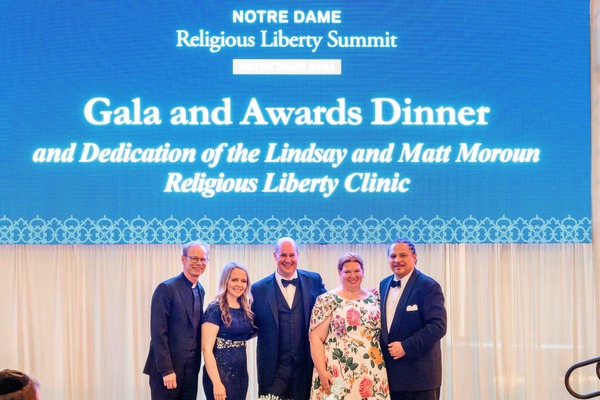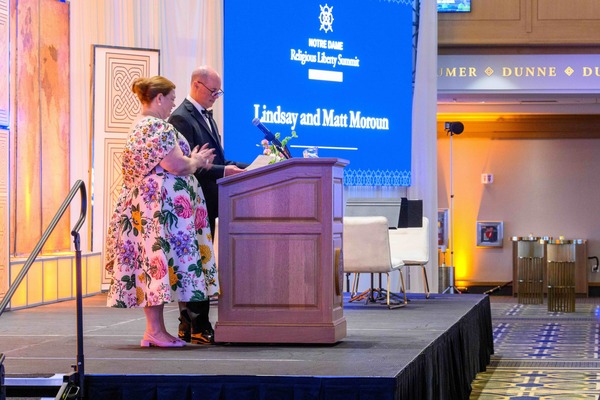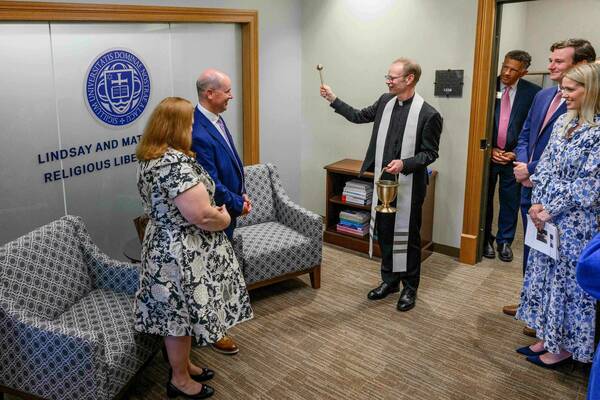Notre Dame Law School clinic to be named the Lindsay and Matt Moroun Religious Liberty Clinic

Notre Dame Law School announced July 10 that its Religious Liberty Clinic will now be named the Lindsay and Matt Moroun Religious Liberty Clinic. The announcement was made during the fourth annual Notre Dame Religious Liberty Summit, which brings together the world’s leading defenders of religious liberty for conversation among clergy, scholars, politicians and advocates.
Notre Dame Law School’s Religious Liberty Clinic was established in 2020 upon a foundational gift from Matt and Lindsay Moroun. Less than five years after its inception, the clinic became one of the largest academic institutions in the world dedicated to promoting and defending religious freedom. The clinic has represented individuals and organizations from diverse faith traditions, with a mission to protect the constitutional right to believe and practice religion freely.
“Without the courage and confidence of Lindsay and Matt Moroun to lead the conversation regarding religious freedom, we could not have come together to begin and continue this important work,” said G. Marcus Cole, the Joseph A. Matson Dean of Notre Dame Law School and founder of the Notre Dame Law School Religious Liberty Initiative. “The Moroun family’s ability to see the vision of what is possible, with faith as the activating principle, is the cornerstone of all that we have accomplished, and we are deeply grateful to them.”
The Moroun family’s generosity ensures that this rich tradition of scholarship and practice can continue. Matt and Lindsay Moroun are passionate about the fight for religious freedom. They believe that Notre Dame Law School is the best place to champion religious freedom across the globe.

“As a Catholic university, Notre Dame has from its founding proven that faith is not only compatible with a free society and the open pursuit of truth, it is necessary to their fulfillment,” said Lindsay and Matt Moroun. “That is why Notre Dame Law School is the ideal home for an initiative that prepares its students to be fearless defenders of every person’s God-given right to live their lives according to their beliefs. We are thrilled to support this mission, and to ensure that it can continue as long as necessary.”
Under the guidance of Law School faculty and staff, student fellows at the clinic work on a variety of legal matters to promote religious freedom, domestically and globally. For example, over the past three years, the clinic has filed numerous briefs and argued before a federal appellate court in support of the Apache people in Apache Stronghold v. United States, a case seeking to protect their sacred land and religious traditions.
In other cases, Notre Dame students have represented U.S. immigrants seeking asylum from religious persecution, advocated for religious ministries’ freedom to serve communities in need, worked alongside government officials to advance religious freedom issues in Nepal and fought to protect religious exercise in prisons.

“The students, faculty and staff in the Religious Liberty Clinic have made incredible strides for religious freedom in the last four years,” said John Meiser, director of the Lindsay and Matt Moroun Religious Liberty Clinic. “I am deeply grateful to the Moroun family, whose generosity has enabled us to give our students unparalleled opportunities to serve people in need and to participate in this critical work to protect our most foundational freedom.”
In addition to their commitment to the Law School, Lindsay and Matt Moroun serve on the Campaign Cabinet, devoting their time to be of service to the University in furtherance of the strategic framework and University priorities during the For Good Initiative. In conjunction with their profound Catholic faith, the Morouns are devoted to their hometown of Detroit and its revitalization, making an impact through business practices that improve the lives of locals as well as unassuming, quiet acts of philanthropy.
Originally published by at law.nd.edu on July 12.
Latest Colleges & Schools
- ‘Prebunking’ false election claims may boost trust in electionsIn recent years, democracies worldwide have seen a growing erosion of trust in election outcomes and institutions, driven in part by fears of widespread fraud. New Notre Dame research finds that “prebunking” — providing accurate information before false claims spread — boosts trust in elections more effectively than traditional fact-checking.
- Justice Amy Coney Barrett to deliver Center for Citizenship and Constitutional Government lectureAmy Coney Barrett, associate justice of the Supreme Court of the United States, will speak at the University of Notre Dame at 4 p.m. Sept. 12 in the Leighton Concert Hall of the DeBartolo Performing Arts Center.
- Three Notre Dame researchers win NEH grants for humanities-based projectsDavid Hernandez, the Eli J. and Helen Shaheen Associate Professor of Classics, and Morgan Munsen, senior research and partnerships program manager at the Nanovic Institute for European Studies in the Keough School of Global Affairs, have each won an NEH Collaborative Research grant. Thomas A. Stapleford, associate professor in the Program of Liberal Studies, is leading a team that has been awarded a Humanities Research Center on Artificial Intelligence grant.
- Open-access database offers insights into U.S. congressional candidatesEach election cycle, thousands of candidates vie for seats in the U.S. House of Representatives and the Senate. Until now, there has been no comprehensive, publicly available resource cataloging what those candidates say about who they are or what they stand for. A new open-access database called CampaignView, created by researchers at the University of Notre Dame, offers researchers, journalists and educators a powerful tool to understand congressional elections.
- First impressions count: How babies are talked about during ultrasounds impacts parent perceptions, caregiving relationshipPsychologist Kaylin Hill studied the impact of a parent’s first impression of their baby during an ultrasound exam. The words used by the medical professional to describe the baby (positive or negative) influence how the parents perceive their baby, relate to them after they're born and even how that child behaves as a toddler. The research has broad implications for how we train medical professionals to interact with expectant parents, as well as how we care for parents during the perinatal period when they are most susceptible to depression.
- Prioritizing prenatal care may decrease low birth weight outcomes in The Gambia, Notre Dame research findsA new study co-authored by University of Notre Dame researchers highlights the importance of prenatal care for improving the health of mothers and newborns, providing evidence that can inform policy.













